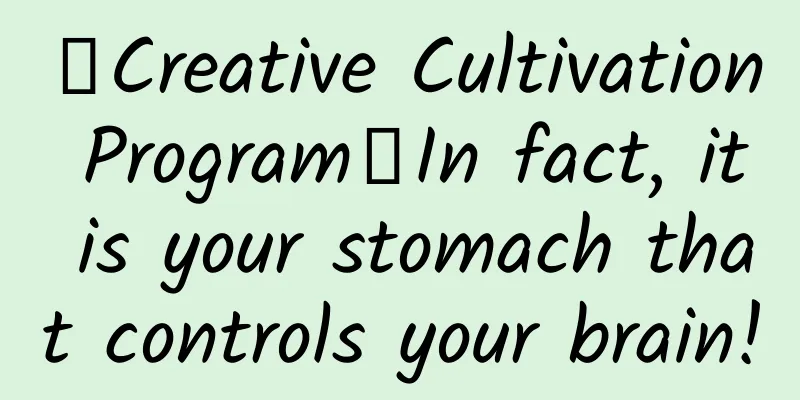【Creative Cultivation Program】In fact, it is your stomach that controls your brain!

|
Author: Chen Wen Reviewer: Associate Professor Tao Ning, Institute of Biophysics, Chinese Academy of Sciences Beer, barbecue, peanuts, edamame, these are the only good things in summer. However, sometimes, we may get upset if we are not careful. At this time, in addition to not eating random foods to regulate the stomach, the intestinal flora in our body will also control the immune system and help us recover as soon as possible. In addition to playing an important role in digestion, regulating human immune function, resisting disease, and producing essential vitamins for the human body, intestinal microorganisms surprisingly also quietly control and reflect our emotions. Think about it, when you eat something delicious, do you feel happy? When you are in a bad mood, you will want to eat something delicious to relieve your sadness. At the same time, your emotions will also be reflected in your gastrointestinal tract - being nervous to the point of having diarrhea is not just a description, but something that really happens in life. So how does the gut affect our mood? The key lies in the pathway between the brain and the gut - the vagus nerve. The vagus nerve allows us to breathe, swallow, and digest food without having to think about it. This nerve connects our brain stem to our digestive organs, and these nerve fibers eventually embed into the lining of our digestive organs. This "highway" allows our brain and gut to "talk to each other." When gut bacteria break down food particles, they produce metabolites that the vagus nerve can sense. In turn, this nerve transmits this information to the brain, which regulates the digestive process. But stress shuts down the vagus nerve, preventing it from performing these important tasks. If the vagus nerve is unresponsive due to stress, it will not release anti-inflammatory molecules that can relieve inflammation. This explains why we have diarrhea when we are stressed. Today, the importance of the brain-gut axis in maintaining homeostasis is recognized and its impact on our emotions is being actively studied. Previously, researchers from Philadelphia conducted systematic experiments hoping to discover the impact of intestinal microbial communities on emotions and psychological susceptibility. The researchers divided the rats into two groups: a control group, which rested in their own territory, and a social conflict group, which was placed in the territory of another aggressive rat, where they would inevitably have a series of tense interactions. The researchers analyzed their fecal samples to compare changes in their intestinal microbial communities. After a period of repeated conflict, the rats in the social conflict group had higher levels of Bacillus and Clostridium, and lower levels of Bacteroidetes. Bacillus microbes contain a variety of anti-inflammatory substances, and an increase in Clostridium is also generally associated with inflammation, and their increase is a healthy response to stress validation. However, the rats in the social conflict group behaved differently—some faced the challenge confidently, while others lay flat and gave up. The levels of the two bacterial communities in these rats were also different—after several days of conflict, the confident rats had an increasing proportion of Bacillus and Clostridium, while the timid rats did not show any adaptive changes in the proportion of these communities. What happens to laboratory rats also happens to us humans. In an analysis of stool samples from patients with clinical depression, scientists found that compared with non-depressed patients, depressed patients had more Enterobacteriaceae and other microorganisms in their intestines, but fewer Faecalibacterium prausnitzii. Moreover, the less this Clostridium, the more severe the depressive symptoms. Now scientists are beginning to look for microbial connections to the brain that could lead to new treatments. Some doctors and drug companies are already exploring probiotics — oral bacterial supplements — for treating depression, though they are not usually included in the missing gut microbes found in the new study. Although our research and understanding of intestinal microorganisms are still in the early stages, it is undeniable that intestinal microorganisms play a role in our emotions. The intestines, as our "second brain", affect human health in a unique way. Next time you encounter something unhappy, eating something delicious may really make you feel better. https://baijiahao.baidu.com/s?id=1688944179424515269&wfr=spider&for=pc https://www.cas.cn/kj/201902/t20190211_4679410.shtml http://www.360doc.com/content/20/0927/07/66709766_937781966.shtml https://view.inews.qq.com/a/20220502A03QG900?startextras=0_cf218020391ee&from=amptj https://zhuanlan.zhihu.com/p/297673556 This article is produced by the Science Popularization China-Creation Cultivation Program. Please indicate the source when reprinting |
<<: Can you eat the snail's tail? Is it yellow or poop inside?
>>: A healthy summer | The battle against mosquitoes in summer, how much do you believe the rumors?
Recommend
What kind of people does the short video operation team need?
To form a team, you need to have your own team. T...
China Passenger Car Association: Narrow passenger car retail sales are expected to reach 2.05 million units in December 2021
In November, the market was affected by both chip...
How much do you know about product conversion: 4 analysis models for high conversion
What is conversion Conversion includes two things...
Lu Mingming QQ Group Precision Traffic Column 4.0 [2022 Edition], creating a group screen domination system
Lu Mingming QQ Group Precision Traffic Column 4.0...
Behind the huge success of "Traveling with the Phoenix", how much do you know about the historical image of the phoenix?
Phoenix The recent ancient puppet drama "Tra...
How to optimize the layout of information flow advertising landing page?
In an information flow advertisement , the role o...
Why doesn’t Durex pursue Wang Baoqiang?
These two days, Everyone was shocked by a breakin...
How much does it cost to make a small program similar to a forum community? How much does the community group buying mini program cost?
Q: How much does it cost to make a small program ...
Chen Xudong: Lenovo has revived Moto's revolutionary and innovative spirit
After being first released in the US market in Ju...
Which is the best server rental company with high bandwidth for Zhengzhou Mobile lines?
Large-bandwidth servers have occupied more and mo...
Exclusive broadcasting has become a shortcut. Can video websites dominate the market by doing so?
January 5 (Reporter Zhang Zhichang) "Exclusi...
Lin Yu's "Douyin Account Diary 1.0" Atypical Short Video Strategy Course
Lin Yu's "Douyin Account Diary 1.0"...
Sohu Video finally invests 100 million yuan to build the first VR content ecosystem
2016 is the first year of VR (virtual reality), a...
What can the Internet of Things do for enterprises?
Internet of Things (IoT) and big data are the nex...









